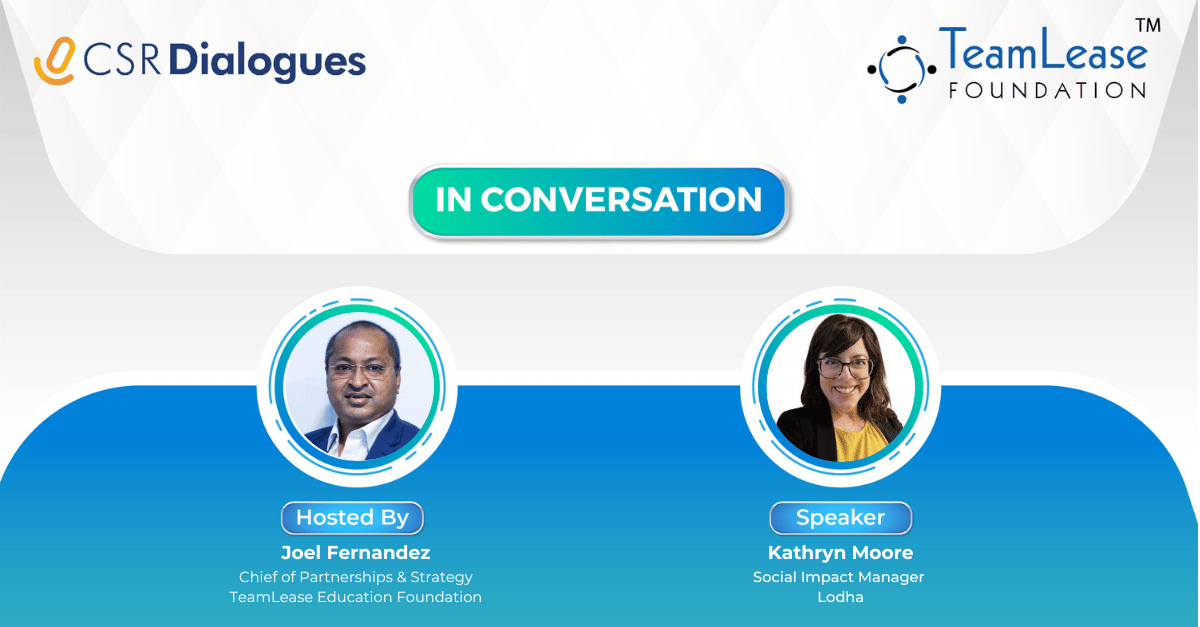In a wide-ranging discussion on the Economic Empowerment of Women, Kathryn Moore,
Social Impact Manager - Lodha, shared her views with Joel Fernandez, Chief of Partnerships & Strategy, TeamLease EdTech Foundation.
Ms. Moore’s perspective was very informative, considering it is backed by over 15 years' experience working in the development sector in over 10 countries mostly in the Asia-Pacific and Sub-Saharan African regions. Her research and practice interests involve early childhood development; education in emergencies and gender equality.
Across India, there are many challenges faced by those working in the women empowerment space, particularly in skills development. And addressing this was how the conversation began with Kathryn Moore. Quoting from studies conducted by Ashoka University’s GenPact Women’s Centre as well as her own experiences on the ground, Ms Moore believed one of the biggest issues faced was the very short period of time young Indian women are able to remain in the workforce - before family responsibilities take over.
In such a scenario, the ROI on extensive skilling programs initiated when a young woman is around 18 years, can barely accrue, before the women leave their jobs around age 30, for child-rearing, elderly care or other such home-based, non-paid roles. This leads to a huge national loss in investments in skilling.
 Ms
Moore believes that all stake-holders - companies hiring these
women, CSR professionals, NGOs and government agencies should
collectively look for ways to enable women to stay on in the
workforce, longer - for instance, key parts to fixing this puzzle
would be providing quality child-care and reliable transport, since
polls have shown that 87% of women leave the workforce due to
safety concerns.
Ms
Moore believes that all stake-holders - companies hiring these
women, CSR professionals, NGOs and government agencies should
collectively look for ways to enable women to stay on in the
workforce, longer - for instance, key parts to fixing this puzzle
would be providing quality child-care and reliable transport, since
polls have shown that 87% of women leave the workforce due to
safety concerns.
Another important aspect of building trust in skilling programs was the need to ensure relevant job placements followed quickly, post-training.
For more on key challenges in skills development of women in India, watch HERE
 Subsequently,
Joel Fernandez and Ms. Moore discussed the benefits of
job-integrated skill development programs for women and how these
could be a game changer, particularly in enabling those women who
dropped off the workforce at 30, to return after the crucial
early-child-rearing years are crossed. This discussion had
many interesting inputs from Ms. Moore, considering her role in
Lodha, which is in the real estate segment which is India’s second
biggest employer (after agriculture).
Subsequently,
Joel Fernandez and Ms. Moore discussed the benefits of
job-integrated skill development programs for women and how these
could be a game changer, particularly in enabling those women who
dropped off the workforce at 30, to return after the crucial
early-child-rearing years are crossed. This discussion had
many interesting inputs from Ms. Moore, considering her role in
Lodha, which is in the real estate segment which is India’s second
biggest employer (after agriculture).
At Lodha, the stated mission is to ensure the high percentage of women employed are also represented up the ladder, in positions of leadership/decision-making, in the design and operations side of the business. Ms Moore revealed that the real estate sector has an abysmal record of just 2 per cent of women in leadership roles.
While discussing how Lodha aimed to break the perception of the construction industry being male-dominated, Ms. Moore’s mention of creating work models like ‘an all-women team on a building project’ could be one way to keep women in the workforce. The moment safety is ensured (via good transport, for instance) and future growth is guaranteed, certainly more women would enlist their family’s support to remain in the workforce.
To learn more about the vision of an ‘all-woman building project’ watch HERE
![]() The
conversation then moved to how tech like Chat GPT, machine learning,
etc could help in overcoming some of the challenges in the
women-specific CSR programs.
The
conversation then moved to how tech like Chat GPT, machine learning,
etc could help in overcoming some of the challenges in the
women-specific CSR programs.
On this count, Ms Moore was very optimistic, highlighting the successes of organizations like Nudge (in Bangalore). On account of the large number of women already using smartphones, across demographics, Nudge was able to seamlessly switch its on-site skilling programs to the virtual model during COVID. With the pandemic proving to be the best testing ground for online initiatives, Nudge has now been able to scale up its skilling programs to cover many, many more women.
Other emerging platforms discussed were the free and open source Tech Equity launched during the G20 Meet, that helps women to improve their financial AND digital literacy. With free access to a number of skill courses, the challenge that remains is to build awareness around such offerings. Ms Moore also highlighted women-specific job portals like Sheroes and Aspire for Her which fast-track women to mentorships, virtual job fairs and a whole lot more.
For details on women-specific skilling/job platforms, watch HERE
![]() How tech could
improve impact-assessment of CSR programs was the next topic
explored. Here, Ms Moore offered a long-term approach to the
challenge. She believed that rather than focussing only on the
number of skilled women placed in jobs, there needed to be
good implementation research. This would highlight what aspect of a
certain program worked well and what needed to be changed or
tweaked. And the research needed to gather data on not just
immediate placements, but long term retention. Overcoming attrition
also calls for looking at what constitutes job satisfaction,
productivity, etc.
How tech could
improve impact-assessment of CSR programs was the next topic
explored. Here, Ms Moore offered a long-term approach to the
challenge. She believed that rather than focussing only on the
number of skilled women placed in jobs, there needed to be
good implementation research. This would highlight what aspect of a
certain program worked well and what needed to be changed or
tweaked. And the research needed to gather data on not just
immediate placements, but long term retention. Overcoming attrition
also calls for looking at what constitutes job satisfaction,
productivity, etc.
The work of a new AI company, Karya, was discussed. With the arrival of ChatGPT, most datasets (collections of text or voice data) are strong in English content but not in Indian languages other than Hindi. This has created huge demand for datasets in languages spoken by millions of people across the world - India alone has 22 official languages and at least 780 more dialects. So Karya links up with rural women and pays them about Rs 400 per hour to read aloud in their native tongue. In the course of using the Karya app, recording their voices regularly and receiving timely payment online for the hours worked, these women’s digital and financial literacy levels shoot up.
Other successful solutions covered included all-women BPOs that reported very high productivity coupled with low attrition. These initiatives also helped large firms live up to their DE7I commitments.
To learn more about how tech can be employed to improve impact of CSR programs, click HERE
![]() Joel
Fernandez then steered the discussion on how the CSR eco-system
viewed partnerships and collaborations with educational
institutions, when it came to vocational training, particularly for
women.
Joel
Fernandez then steered the discussion on how the CSR eco-system
viewed partnerships and collaborations with educational
institutions, when it came to vocational training, particularly for
women.
Ms. Moore contended that lack of employability was a problem for men and women. Often candidates straight out of college satisfied merely 40- 50 per cent of the job requirements, so vocational training linked to educational qualifications could be a good solution for young girls and boys. Ms. Moore flagged another study from Ashoka University's Genpact Center for Women which reported that of the women that do return to the workforce, merely four months after re-entering the workforce, many are dropping out again - this was primarily because of not having the skills required for the job.
Learn more about how educational institute-linked vocational training works HERE
![]() The
stimulating session ended on programs that had succeeded. Ms
Moore chose to speak of a project she’d worked on in East Timor,
near Indonesia. She picked this as an example of what could be
achieved when multiple stakeholders work together. In her
example, civil society, government agencies, NGOs and the private
sector with twin tracked agendas worked to increase access to
preschool AND increase the pipeline of trained educators to provide
preschool education.
The
stimulating session ended on programs that had succeeded. Ms
Moore chose to speak of a project she’d worked on in East Timor,
near Indonesia. She picked this as an example of what could be
achieved when multiple stakeholders work together. In her
example, civil society, government agencies, NGOs and the private
sector with twin tracked agendas worked to increase access to
preschool AND increase the pipeline of trained educators to provide
preschool education.
Ms Moore believed that such programs that fulfilled both short term and long term goals needed support from all quarters. So, at East Timor, by working closely with different partners, the project was able to expand preschool education in rural areas through training done by NGOs. This was linked with the government’s curriculum. In this way the preschool education network expanded. And jobs for men and women in the preschool education sector increased - putting them on track for possibly even better paid jobs in the future.
With the success of this program to inspire her, Ms Moore hopes to initiate programs at Lodha too, which fulfill multiple goals - bringing work closer to women, improving safety conditions for them while also increasing the number of women in the workforce.
To learn more about successful CSR programs in India and abroad, click HERE





